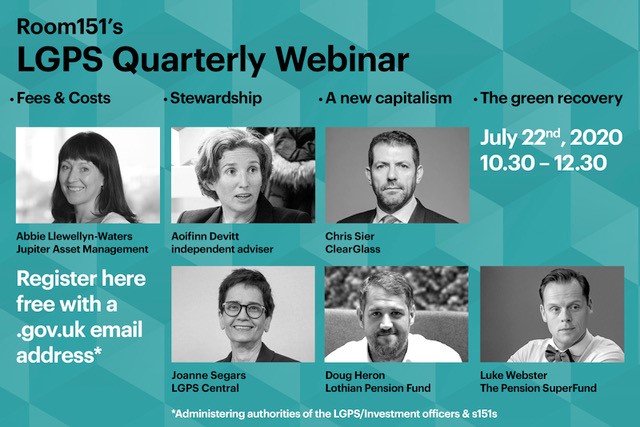
Many companies will require further funding as the pandemic recedes. William Bourne argues this may be an opportunity for LGPS to have an “impact” on ailing businesses and the economy.
The government’s response to the Covid-19 crisis has been to throw money at the economy indiscriminately in the hope that enough sticks to fire it up again. That isn’t going to work at corporate level: some companies will fold, and many will need substantial financial help to survive. This question here is whether the LGPS, with getting on for £300bn of assets, could play a part in getting the country back on its feet again.
I’ll start with the problem. After government-imposed lockdowns round the world, many companies are in financial trouble because they have been unable to trade. We can see that on the High Street, with property companies and retailers going into administration. But it is true across many other sectors, including some previously considered quite solid, such as train companies and airports.
Some are in trouble because their owners imposed excessive leverage (the private equity industry’s average gearing is 600%) and cannot pay the interest due. Others are in trouble because they have insufficient liquidity to survive three months without trading. And others need to invest to adapt their business model to the new normal. The common factor is the requirement for new finance.

There is no shortage of people queuing up to provide this. Some companies (Whitbread, for example) have simply gone to existing shareholders via a placing or a rights issue. This works for large quoted companies who can move quickly in a rising stockmarket. It will probably be more difficult as time goes by and impossible for unquoted firms.
Many private sector asset managers are looking at the opportunity; I recently saw an estimate that over 130 are actively raising money for this purpose. They include both private and public credit and equity managers, though the need is more for equity injections than further borrowing, simply because leverage levels are already high. I’d argue that the potential upside from equity makes it more advantageous to investors providing finance.
Impact
So, where does the LGPS come in? At one level because it is a patient long-term investor who can expect to generate sustainable returns in a world where they are ever harder to come by. However, there is also the increasing focus on investing to create “impact”, ie. investors using their funds to provide additional benefits to the community above the financial return. This would fit squarely in that bracket, in that it would help firms and communities during what is likely to be the worst economic event of our lifetime.
And how might it work in practice? The universe of target companies does not fit neatly into one bucket, as it covers both private and public markets. It will require a complex set of skills: identifying target companies, negotiating the terms of any new finance—quite possibly not just with the company but also other stakeholders such as existing bond-holders—and in some cases supporting the company through needed changes to its business model. Private managers may have the more relevant skill-set, but public equity managers will be more accustomed to working with, and influencing, companies without majority control.
Then there is the ethical issue of what is a reasonable return to ask for in the current circumstances, first as investors and then, secondly, as the fund managers. The market will almost certainly decide the first by balancing supply and demand in aggregate and assessing the risk of individual propositions. Here I would comment that, with nearly half the economy having experienced lockdown, demand is likely to be high. On the other hand, private equity already has US$2.5tn of “dry powder” and there will be competition for the juicier assets. So, returns are more likely to be in line with sub-investment grade corporate loans than distressed debt or traditional private equity.
Fees
And should the fund managers be expected to do this for a lower fee than normal, as part of the asset management community’s contribution to resurrecting the country, or is this simply another marketing opportunity for them? I would argue there is a strong case for the former. There may also be long-term and more purpose-driven not-for-profit entities, such as the BGF (the British Growth Fund), who can demonstrate substantially better alignment than the large City-based asset managers.
From the perspective of the LGPS funds and pools, the challenge will be fitting this kind of investment into their own portfolios when so much else is going on. While I expect the opportunity described here to carry on for a number of years, clearly some companies are going to need help sooner rather than later.
There are plenty of obstacles: due diligence will be more difficult in lock-down circumstances; resources at partner funds are thin because of pooling; the propositions may not fit neatly into investment consultant’s buckets; and, as ever, there are the constraints of public procurement. But I would urge the LGPS community, pools, partner funds, and advisers and consultants to put time and effort into looking at the new funds being set up to help after Covid-19. It might well turn out to be the easiest way of fulfilling fiduciary duty by generating an adequate return and also demonstrating that the funds are being used for the wider community’s benefit.
Did I call that the Holy Grail?
William Bourne is an independent adviser to three LGPS Funds and Director of Linchpin Advisory Limited.
FREE monthly and weekly newsletters
Subscribe to Room151 Newsletters
Monthly Online Treasury Briefing
Sign up here with a .gov.uk email address
Room151 Webinars
Visit the Room151 channel













